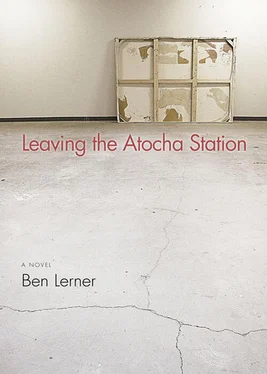A plate of steak tartare was brought to us and Isabel looked at it with muffled surprise and it was clear she had never imagined eating finely chopped raw beef. I asked her how Rufina was as I served her a punishingly large portion and it was suddenly obvious, much more obvious than I intended, that my clothes and the expensive meal were saying to Isabel: of course I never took our relationship seriously; I am a fabulously wealthy American from the United States of Bush, I have merely been acquiring experience, slumming, etc. I felt a wave of guilt and wanted to apologize and worried, having felt a wave of anything, that I was headed for a precipice. I could barely make myself eat. Isabel didn’t respond to my question, but I had the sense that, if she were embarrassed, it was only on my behalf.
Plates were taken away and new ones arrived; Isabel appeared relieved by the familiarity of the artichokes and asparagus wrapped in bacon; I couldn’t taste anything. I was moving at inappropriate speed through the wine. I asked what Oscar was doing in Barcelona and she said either that he was a mechanic or was being retrained for something mechanical or that he sold cars or worked for a car company; I didn’t care. I asked what he looked like and she put her hand on my hand and said let’s not talk about Oscar, let this be our night. I smiled at her and tried to look relaxed but when the next dish was brought, something involving caviar and maybe quail eggs, I thought that I might vomit. I could not attempt a bite and my face felt hot and I could barely drink the wine, but did. I must have looked terrible; Isabel asked if I was all right. In my head I said no, my mom just died, and I laughed aloud and my laugh was aberrant. I said that I was fine, but as I said it, I realized for the first time that I was without my yellow pills; I couldn’t have brought my bag to such a restaurant and hadn’t thought to transfer the yellow pills to my jacket pocket because in the last week of my protracted neuropathy I hadn’t taken any. Still, I reached into the jacket pocket and felt the necklace in its case and began to panic; I was respiring no oxygen when I inhaled; it was like trying to drink through a straw with many holes. I said excuse me, stood on very weak legs, the floor uneven now, and walked to the bathroom, which was as lavish as everything else and smelled like roses. I splashed water on my face and told myself, aloud, to calm down, and for a second I felt better, that this would pass, and then I noticed for the first time that there was an attendant in the bathroom, which again made me feel crazy. The chemical taste I often experienced after panic was already in my mouth, an ominous sign; I spat in the sink despite the attendant, rinsed, but the taste intensified. I felt another wave of nausea and went into a stall and vomited. For a moment it occurred to me that I might be having a medical emergency; if I died, blood tests would reveal to my family that, as the saying goes, drugs were involved. The blood tests, the credit card bill, the notebooks filled with incomprehensible poems — had I tried to kill myself without my knowledge, were those so many suicide notes? I sat on the toilet with my head in my hands and cried as quietly as possible. Fortunately, the crying helped. Eventually I stopped heaving, left the stall, and again splashed water on my face. The attendant asked me if I was all right. I blinked at him, breathed deeply, mumbled something about my family, and deposited a handful of coins in the bowl beside him, which might have been for mints.
I felt much better now, that is, I felt next to nothing as I returned to the table where Isabel awaited me with genuine concern. I said I was sorry, that I’d had a dizzy spell, but it had passed, and I drank my wine and felt restored. I wasn’t sure how long I’d been gone but the table had been cleared and soon we were served lamb and something involving lobster along with a new bottle of red wine the waiter explained was related to the white. I wasn’t hungry but I was no longer repulsed by the food and as I ate a little I asked Isabel what she wanted to do after dinner. She said she didn’t know and I said that we could do anything she wanted. She thought for a while and smiled and said that she had never spent the night at a fancy hotel. I heard myself say we would stay in the Ritz — Carlton directly opposite the Prado. As I drank more I could eat more and as I grew drunker the money became increasingly unreal. This was accompanied by a wave of benevolence that I directed at Isabel, and I began to speak to her in a Spanish that sounded, at least to me, impeccable.
“I have been upset since we talked about Oscar. When you told me about him, I realized how much I cared about you, and it’s very hard to know that I won’t be able to see you again,” I said.
“Yes,” she said, without malice, “but what does it mean that you only realized how much you cared when you heard about Oscar?”
“I didn’t mean that exactly, but it’s difficult to express myself with subtlety in Spanish,” I said.
“You are fluent in Spanish, Adán,” she said, maybe sadly.
“I was angry and jealous and hurt and acting like a teenager,” I ignored her. “But now I just want to tell you how wonderful it’s been to spend time with you, how wonderful I think you are, and how, while it’s painful for me that you’ll be with someone else, I wish you only the best.” I started to reach for my glass to toast her but then thought that would be ridiculous.
She opened her mouth, but hesitated before speaking, and for some reason it suddenly occurred to me: there is no Oscar. Oscar was a test, it was revenge for my insisting on having a separate social life, for the reading in Salamanca. It was a trap to move me toward some kind of commitment. I was waiting for my emotional response to this revelation to declare itself when she refuted it: “You are very sweet. I will always love you.” Her tone made it clear that she loved a lot of people in a lot of ways.
Two men cleared our plates and scraped the tablecloth and gave me a dessert menu that I handed to Isabel and I asked if they had half bottles of champagne; they did, I ordered one, and Isabel asked me what I wanted for dessert. I wondered if she’d ever had crème brûlée. She said she hadn’t so we ordered it and they brought chocolate — covered strawberries compliments of the chef with our champagne. I began to make fun of the waiters’ seriousness and Isabel found it hilarious; we were laughing loudly, attracting glances. We had a few bites of the dessert and finished the champagne and were by then quite drunk. I did not look at the check when it came. The waiter returned my card, I signed the receipt, and left a large tip in cash, probably a faux pas.
They called us a cab and we stumbled into it and I asked for the Ritz, the very name of which struck us both as hysterical, and we made out for the length of the ride. I paid and we went into the hotel and I spoke to the receptionist in English.
“I’m just in from New York and need a room for the night,” I said, as if the words “New York” explained everything. Isabel seemed impressed by my English.
The receptionist typed on a computer and said, “We have available to you sir a classic room with a king bed and a balcony.”
“Remind me how much those rooms are,” I said, my eyebrows suggesting I was only curious how these rates compared to New York, Milan, Paris.
“They are three hundred and ninety euros per night sir,” she said.
I considered telling Isabel that no rooms were available, but even without English, she would discern it was a lie. “O.K.,” I said, thinking of my apartment two hundred yards away; my rent was three hundred and seventy — five euros a month.
I asked if I could pay in advance and did. The receptionist began to say something about luggage, then coughed her way out of it. A bellboy, if that’s the word, led us to our room, which was as fancy as the restaurant, and I asked him in English if he would bring us a bottle of the cheapest white wine they had; he said of course, but refused to return my conspiratorial smile. Isabel slipped off her shoes and opened the windows and said she was going to take a shower. The wine was there by the time she came out of the bathroom wearing one of the hotel’s plush white robes; we drank, made love, and then smoked near the window. I ordered another bottle, my affectedly formal manner on the phone uproarious to Isabel. Then we made love again and smoked again, Isabel now drunker than I’d ever seen her; she held my head in her hands, mumbling something I couldn’t understand, barely Spanish. Finally she passed out and I stood alone at the window, the room dark, and looked across the street at the Prado. I thought of the great artist for a while.
Читать дальше












